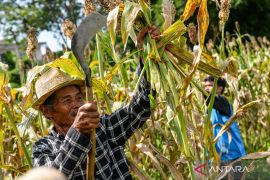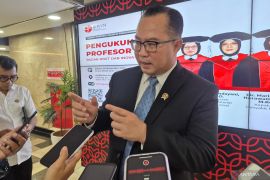The potential of functional food must be raised as an effort to solve food issues at the local, regional, national, and global levelsJakarta (ANTARA) - The National Research and Innovation Agency (BRIN) has continued to encourage the development of functional food made from local ingredients by utilizing Indonesia's biodiversity to strengthen national food security.
"The potential of functional food must be raised as an effort to solve food issues at the local, regional, national, and global levels," the head of BRIN's Agriculture and Food Research Organization, Puji Lestari, said during a webinar organized by the agency on Friday.
Therefore, BRIN has continued to conduct research and development to produce various kinds of functional food, which are also useful for supporting public health, she informed.
Functional food is processed food containing one or more food components with certain physiological functions beyond their basic functions, which are proven to be harmless but beneficial to health, Lestari explained.
Such physiological functions include the capability to prevent disease, increase body resistance, slow down the aging process, and rejuvenate health, she said.
Related news: BRIN bolsters data gathering infrastructure amid blue economy push
According to Lestari, the impact of the COVID-19 pandemic, climate change, and geopolitical crisis has disrupted food demand and supply. This has the potential to push up food prices to higher levels until 2023.
Currently, the Indonesian government is actively looking for new alternative food sources, both individually and collectively, to strengthen food and social stability. According to her, functional food can be one such option.
Public awareness of health has indirectly influenced the growth of functional food products, she noted. The increasing level of lifestyle changes has led people to choose food products that are not only filling but also have certain health functions.
Related news: Need to improve local food development to anticipate crisis: BRIN
She said that functional food must use ingredients that meet the quality standards and safety requirements, are beneficial to health, and are served and consumed like foods or drinks. As a food product, functional food must have characteristics and tastes that are acceptable to consumers.
Earlier, BRIN researcher Ainia Herminiati said there is potential for local food ingredients to be used as functional foods, for instance, fruits can be a source of vitamins, minerals, and dietary fiber to maintain the body's immune system.
There are at least 400 types of native Indonesian fruit plants. The processes of supplementation, fortification, and enrichment can be carried out in the development of local food innovations, Herminiati said.
Some examples of research-based functional food include prebiotic banana bars, banana flakes for toddlers, products from mocaf (modified cassava flour) such as dry noodles, pasta, instant porridge, instant pudding, biscuits, and snacks that are fortified with vitamins and minerals.
They further include aloe vera drinks (Aloegin), which serve as immunostimulants; groundcherry-based beverage products for diabetes mellitus prevention; and probiotic powder health drinks made from Amorphophallus muelleri.
Related news: BRIN develops virus-like particle to make vaccines
Related news: Mercury use at six small gold mines down 23 tons: ministry
Translator: Martha Herlinawati S, Resinta S
Editor: Fardah Assegaf
Copyright © ANTARA 2022












